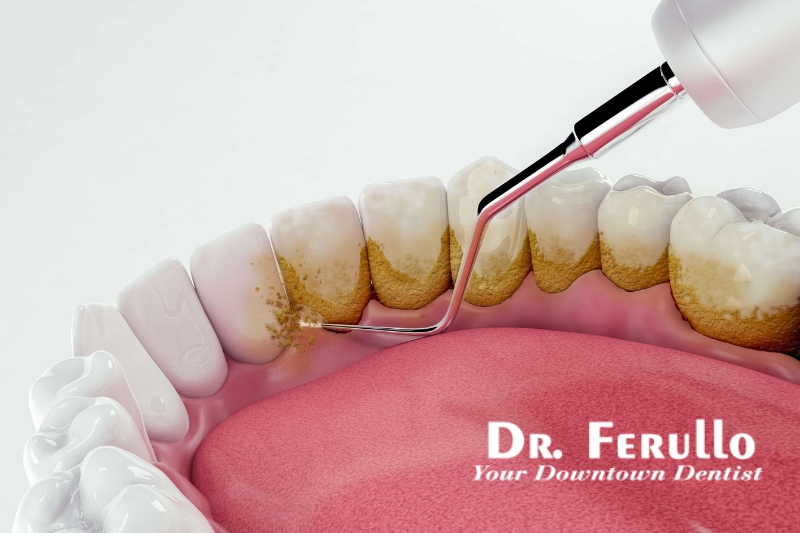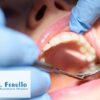
Why Do My Gums Keep Bleeding?
Proper brushing and flossing make your teeth feel healthier and your breath more refreshed. But when you spit into the sink and a bunch of blood comes out, this can be a rather frightening experience. Unfortunately, this is a very common occurrence. Many of our patients ask, “Why do my gums keep bleeding?”
The answer isn’t always an easy one because there are many different reasons why this might happen, from improper dental care to certain types of diseases and everything in between.
Let’s take a quick look at the most common reasons for bleeding gums:
Sporadic Brushing and Flossing
To ensure proper dental health, you should be brushing your teeth twice a day and flossing at least once a day. Sporadic brushing and flossing can cause your gums to bleed because they have become sensitive between sessions. If you return to a regular oral hygiene routine, the bleeding should stop within a week or so.
Gingivitis or Periodontitis
Any damage to your gums can result in bleeding. Gingivitis, the first stage of periodontal disease, will cause your gums to become swollen and tender. The same is obviously true with periodontitis, which is an advanced state. If you’re suffering from either of these stages of gum disease, any brushing or flossing could cause your gums to bleed.
Aggressive Brushing and Flossing
Some people have a problem with brushing or flossing too lightly, while others are far too aggressive. If you scrub your teeth too hard or floss with too much vigor, then you’re very likely to make your gums bleed. Not only should you be using mild strokes, but it’s also a good idea to brush only with a soft-bristled brush.
Blood-Thinning Meds
Millions of people are on warfarin and other types of blood thinners. Whenever you’re taking a blood thinner, either orally or by injection, you’re more likely to bleed a larger amount than usual. If you’re on any of these medications, use a soft toothbrush and be careful when flossing.
Improperly Fitting Dentures
After someone has worn dentures for a while, their gums are likely to change shape. This can cause the dentures to rub up against their gums, leading to sores and bleeding. If your dentures are no longer fitting the way they used to and you’re experiencing discomfort or bleeding gums, contact a dentist to make adjustments right away.
Pregnancy Gingivitis
Pregnancy comes with a lot of body changes. During this time, you may experience bleeding gums due to a variety of issues, including the increase in estrogen and progesterone hormone production. There will also be a decrease in saliva production, along with more acidic saliva, which means your enamel is less protected. Of course, who can forget morning sickness, which causes acid to come up from your stomach and over your teeth?
Insufficient Vitamin K
Our body needs a variety of vitamins in order to work properly. Vitamin K improves our blood’s ability to clot. If you’re running low on vitamin K, then your blood won’t be able to clot as well as it should. This can increase the likelihood that your gums will bleed whenever you brush or floss.
Insufficient Vitamin C
Vitamin C is important to help your body grow and repair tissue. It also strengthens your bones and teeth. If you don’t get enough vitamin C, your gums won’t be able to heal properly. This means that any damage to your gums may be longer-lasting, resulting in an increase in bleeding.
Some Types of Diseases
Unfortunately, there are many different types of diseases and disorders that can cause your gums to bleed whenever you brush your teeth.
Here are some of the most common ones that we’ve seen in our patients:
- Diabetes — Bleeding gums are a very common sign of diabetes. This disease makes it harder for your body to ward off germs, which makes people more susceptible to gum disease.
- Hemophilia — With this disorder, a person’s blood is unable to clot properly. This can cause bleeding from damaged gums and dental work.
- Leukemia — This incurable cancer deprives a person’s body of enough platelets for their blood to clot properly. This makes a person more susceptible to continued bleeding in the gums.
- Thrombocytopenia — Like leukemia, thrombocytopenia causes clotting problems because of a platelet deficiency. This results in excess bleeding in the gums and other areas of the body.
Contact Dr. Ferullo to Treat Bleeding Gums
Dr. Ferullo can treat bleeding gums and other dental problems. If you have any questions similar to “Why do my gums keep bleeding?” or would like to set up an appointment, call our St. Petersburg dentist office at (727) 822-8101 today.
Also, be sure to ask about our free whitening treatments for new patients.







